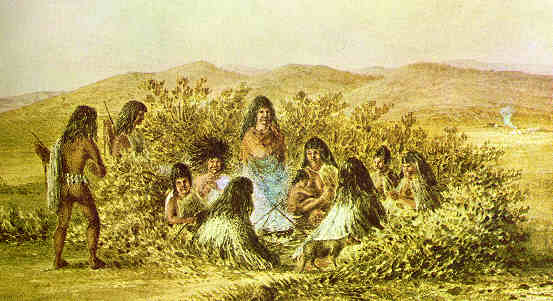
Goshute Indian Habitation, Pleasant Valley, Nevada.
Drawn by H.V.A. vonBreckh, artist for the 1859 Simpson Expedition.
--picture from Nevada Highways and Parks, 1964 Centennial Issue, p.23.
After a civil government was established in Utah in 1858, Brigham Young was replaced as Indian Agent by several corrupt Federal appointees before the arrival of Col. Benjamin Davis. Hunger and hardship had forced the Indians in Nevada to attack immigrant wagons and the Pony Express. Col. Davis understood the problem from the viewpoint of the Indians and decided to deal with them as equals, an approach that regrettably was seldom taken in the history of the American West.
Our William Adams Hickman served as guide and translator to an expedition which set out in the winter of 1860 bearing gifts to visit the Indians of northern Nevada at a campsite southwest of present-day Elko, and the following is an interesting account in which Bill describes the experience to the readers of the Deseret News:
SUPERINTENDENT DAVIS AND THE INDIANS.
----o----
RUBY VALLEY, U. T., Dec. 16, 1860.
EDITOR NEWS:---As everything pertaining to public affairs in our Territory, especially our Indian relations, is of interest to the public, I avail myself of this opportunity to give your readers a brief sketch of my trip as guide to the expedition of Col. Davis, the newly appointed Superintendent of Indian Affairs for Utah, to the Gosutes and Shoshones, who have been killing, robbing and shooting at the mail and express riders all along this route from Salt Lake City to Carson Valley, ever since last spring.
We left Great Salt Lake City on Monday, the 26th day of November last; our train consisted of four wagons, one ambulance, and two outriders on horseback. Col. Davis, Superintendent, was chief in command; Major Rogers, farm agent at Ruby valley, second, and myself third. Nothing of note has transpired during our trip. The weather has been generally quite cold, and we have had some rain and three snow storms.
The Indians have met us at every fixed or designated place in great numbers, and Col. Davis has distributed presents among them. Deep as the snow has been, and cold as the weather is, they have come--men, women and children--to meet their "new Captain," as they call the Col., and he pleases them all.
When they first approach us they appear timid and suspicious; but, by his superior knowledge of the Indian character and from his past experience, Col. Davis soon dispels their fears, and they begin to laugh and jabber as if we were all Indians together. He has literally fed the hungry and clothed the naked, and carried universal joy into the hearts of these poor, destitute creatures, to an extent they never felt before. He operates in an entirely new and different way from all other Indian officers I have seen in this country.
It is only repeating what is everywhere known, that by mismanagement the confidence and good feeling of the Indians towards the whites has been almost entirely destroyed. Col. Davis has already restored confidence wherever he has met the Indians, as I have witnessed on this expedition, which terminates at this place.
Had the reader been present as I have been, and witnessed their merrymaking and rejoicing as they sported the fine blankets, shirts, leggings, hats, feathers and other ornaments, women's dresses, sacks, rings, beads, paints, bells, hatchets, knives, looking glasses, combs, boots, shoes, pants, and so on, whilst others were feasting on the fine flour, beef and bacon he furnished them, it would have done his soul good, unless, indeed, he had no heart to rejoice at human happiness.
If the course adopted and pursued by Superintendent Davis be followed up, I hazard nothing in saying that a few years will suffice to make all the Indians in these mountains contented and happy, and there will be no more complaints of wars and robberies among them. Whilst I am writing, their merry songs in their wikkiups are ringing in my ears, and their chiefs and head men are delighted beyond measure.
I have written this to let the public know that we have seen hundreds and hundreds of these fighting, troublesome Indians, and that they promise to be peaceable and orderly; and their chiefs assure us that they will punish the refractory ones, until they break up stealing and fighting altogether.
WM. A. HICKMAN.
--Deseret News, Wed Dec 26 1860 p.344.
To explore James H. Simpson's 1859 map of the Great Basin, click here.
To locate and explore Ruby Valley, Nevada on a modern map, click here.
To learn more about William Adams Hickman, click here.
To return to the Hickman Family index page, click here.